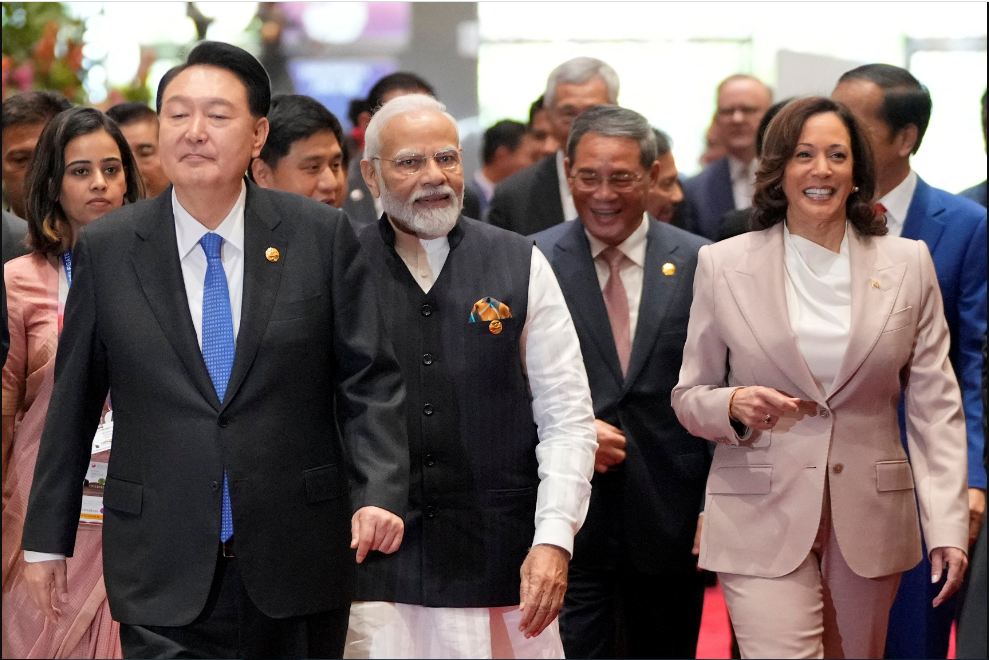Southeast Asians wary of new conflicts as big powers join ASEAN summit
Jakarta (Reuters) – Indonesian President Joko Widodo called on world leaders on Thursday to defuse tensions as they met at a Southeast Asian-hosted summit to focus on security and trade against a backdrop of intensifying big-power rivalries.
U.S. Vice President Kamala Harris, Chinese Premier Li Qiang, and Russian Foreign Minister Sergei Lavrov joined the summit in the Indonesian capital led by the Association of Southeast Asian Nations (ASEAN), along with leaders of partner countries Japan, South Korea, India, Australia and others.
An undercurrent of tension has accompanied the talks on issues from trade and technology to China’s increasing assertiveness in the South China Sea, the Myanmar junta’s refusal to cooperate with ASEAN on a peace plan, and suspicion North Korea plans to supply weapons to Russia.
“We all have a responsibility to not create new conflict, new tension, new war and at the same time we also have a responsibility to reduce tensions,” Widodo, as chair of the 10-member ASEAN bloc this year, said at the beginning of the East Asia Summit.
Indonesia said the forum should be a place for cooperation and not for the sharpening of animosities.
Indonesia and other Southeast Asian countries have warned this week of “destructive” rivalries between major powers, a reference to looming U.S.-China tensions that they say puts them in danger.
On Wednesday, China’s Li warned against starting a “new Cold War” and warned countries against taking sides in any conflict.
Harris, attending the meetings instead of President Joe Biden, reiterated a U.S. commitment to the region.
“The United States has an enduring commitment to Southeast Asia and more broadly to the Indo-Pacific,” she said.
A White House official said earlier the U.S. shared interests with ASEAN in “upholding the rules-based international order, including in the South China Sea, in the face of China’s unlawful maritime claims and provocative actions”.
Harris underscored U.S. opposition to “unilateral changes to the status quo in the South China Sea and East China Sea” in meetings with Japanese Prime Minister Fumio Kishida and Philippine President Ferdinand Marcos, a White House spokesperson said. China and Japan both claim a tiny group of islands in the East China Sea.
South Korean President Yoon Suk Yeol, another staunch U.S. ally, said any attempts to change the status quo by force in the South China Sea could not be tolerated.
Mayanmar Crisis
China’s Li and Japan’s Kishida met briefly on the sidelines of the summit on Wednesday and discussed Japan’s release into the sea of treated radioactive water from the Fukushima nuclear plant.
An infuriated China has banned on all aquatic imports from Japan in response.
ASEAN leaders are also grappling with conflict in Myanmar, a member of their grouping beset by violence since the military ousted a government led by Aung San Suu Kyi in 2021.
ASEAN has tried unsuccessfully to push for peace in Myanmar leading to questions about the influence of their politically diverse group.
Earlier in the week, ASEAN leaders expressed “grave concern” over the lack of progress on their peace plan but Myanmar said it rejected the comment and ASEAN should stick to its principle of not interfering in each other’s affairs.
Bangladesh President Mohammad Shahabuddin called for urgent action to find a solution to the turmoil in neighbouring Myanmar. Nearly one million Rohingya Muslims are living in camps in Bangladesh after fleeing from a military-led crackdown in Buddhist-majority Myanmar in 2017.
“It’s the collective responsibility of the international community to find the durable solution to this crisis,” he said at a meeting with ASEAN and other countries.
U.N. Secretary-General António Guterres said Myanmar was facing a “worsening political, humanitarian, and human rights” situation, and repeated calls for the junta to release all political prisoners.


